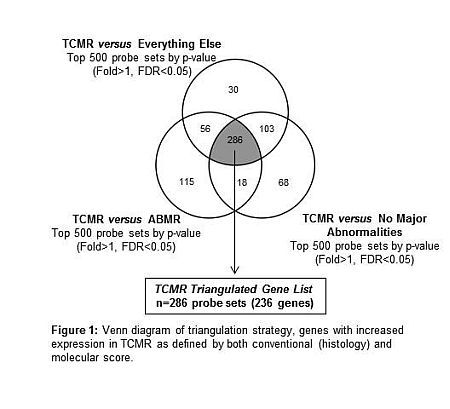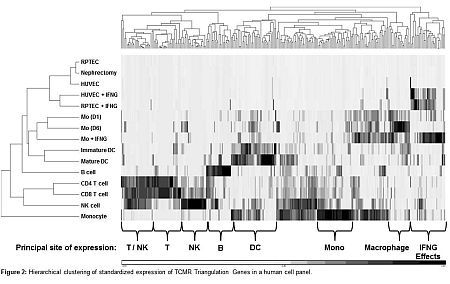Molecular Landscape of T Cell-Mediated Rejection: The T Cell Synapse Emerges, The
University of Alberta, Edmonton, Canada
Meeting: 2013 American Transplant Congress
Abstract number: C1167
The molecular landscape of T cell-mediated rejection (TCMR) is obscured by secondary inflammation and injury. We hypothesized the transcripts most highly associated with TCMR would reveal the cognate recognition process unique to TCMR. We studied the molecular phenotype of TCMR in microarrays of 403 human kidney transplant indication biopsies that had been assigned both histologic and molecular diagnoses of TCMR. We defined transcripts significantly increased in TCMR by a triangulation strategy: TCMR vs. all other diseases; TCMR vs. antibody-mediated rejection (ABMR); and TCMR vs. stable transplants (Figure 1). This generated a set of molecules highly associated with TCMR and distinct from other diseases, including ABMR.
In human cell lines, the TCMR triangulation molecules were expressed in T cells, macrophages, dendritic cells, and B cells (Figure 2). Ingenuity Pathway Analysis (IPA) revealed high association of the TCMR molecules with canonical pathways of proximal TCR signaling and costimulation – ICOS, CD28, CTLA4, and CD40 signaling – signal 1 and signal 2. In contrast, signal 3 (IL2 and IL15 signaling) and effector molecules (e.g. granzymes) were not among the triangulated molecules. Some of the most significantly associated molecules were expressed in macrophages and dendritic cells: ADAMDEC1 and CXCL13.
Gene set enrichment analysis (GSEA) showed no hits, indicating that the biology represented in the triangulation transcripts has not been previously captured and represents new insight. We propose the most fundamental molecular event in TCMR is the synapse of the T cell with antigen presenting cells – dendritic cells, macrophages, and B cells – forming the cognate recognition unit of TCMR. TCMR then produces massive secondary disturbances via IFNG and TGFB effects and an injury-repair response of the parenchyma, but these downstream events are shared with other diseases.


To cite this abstract in AMA style:
Venner J, Famulski K, Halloran P. Molecular Landscape of T Cell-Mediated Rejection: The T Cell Synapse Emerges, The [abstract]. Am J Transplant. 2013; 13 (suppl 5). https://atcmeetingabstracts.com/abstract/molecular-landscape-of-t-cell-mediated-rejection-the-t-cell-synapse-emerges-the/. Accessed February 15, 2026.« Back to 2013 American Transplant Congress
